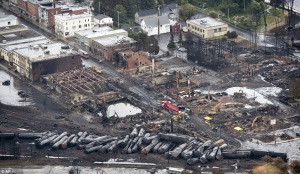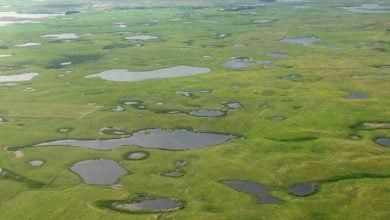Pittsburg, Calif., is one of many communities protesting the transportation of crude oil by rail
Originally published in Liberation Newspaper, May 2015
On Feb. 16, a train towing more than 100 tankers of crude oil derailed in West Virginia, outside of Mt. Carbon, causing a huge explosion and oil leaks into Armstrong Creek, a tributary of the Kanawha River. The fire burned for days. The disaster was large enough to force West Virginia Governor Earl Ray Tomblin to declare a state of emergency.
Beyond the explosion and the inferno that followed, concerns still linger about the contamination of the local water supply. CSX, the railroad corporation, has refused to disclose exactly how much oil was spilled in the wreck. Lawrence Messina of the West Virginia Department of Military Affairs and Public Safety gave no comfort when he said, “The best way to deal with this is to let that fuel burn out.”
It is no coincidence that these environmental disasters take place most frequently in poor communities, which are generally neglected by government agencies and the mainstream media. Although West Virginia and other coal-producing regions literally fueled the United States’ industrial development, its poverty rate is around 18 percent.
An increasingly common tragedy

This Mt. Carbon spill comes just over one year after, and only 30 miles away from, another spill of crude MCHM—a highly toxic chemical used in coal mining—which contaminated the local water supply. In July 2013, in a small town in Quebec, Canada, a derailment caused a massive explosion and the deaths of 47 people.
These disasters have become all too frequent in recent years as the amount of oil being shipped by train has skyrocketed along with the boom in production in the U.S. Midwest. In 2014, the Department of Transportation estimated that for the next two decades we can expect 10 of these tragic derailments per year. This could increase as bosses squeeze more work out of drivers and inspectors at the expense of safety. Many of these oil train derailments occur near Indigenous communities, which are also especially impacted by the extraction of oil and gas.
Oil companies and their paid henchmen in Congress have made the cynical and false suggestion that there would be fewer derailments and spills if the construction of the Keystone XL underground pipeline were allowed. The reality is that oil distributors in some areas, such as North Dakota, have chosen rail over pipelines for a variety of reasons. But pipelines are spilling too. Telling people they have to choose between the two methods is like saying, “Pick your poison.”
These recurring spills shows just how disposable life is in a system where profit comes first. This is class war waged on environmental terms. It confirms the socialist view that whether it is labor or living conditions, the capitalist class puts their profits first and makes already-oppressed people suffer the most. It can end when a whole new system is set up to meet the needs of the people and the planet.






